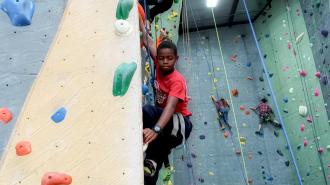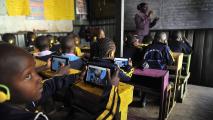For decades, Washington state has been among the leaders in refugee resettlement. Many of them are children facing violence or other forms of persecution. But a Seattle-based non-profit is teaching them to rock climb — helping displaced children to face new challenges.
Every Wednesday, about a dozen children, meet up at Vertical World, an indoor rock-climbing gym in Seattle. A few weeks prior, they were living in places like Africa, India, or Afghanistan. Now, as refugees in America, new to the country and often even the English language, Stone Masters, a program of Vertical Generation, plans to dangle them from an indoor cliff — 50 feet in the air.
“We’re using rock climbing as a way to teach and enforce strengths, like problem-solving and learning how to deal with adversity,” says Michael Manuel, a Stone Masters volunteer mentor. After climbing, the kids spend time playing games or working on schoolwork.
Refugees are people who were forced to leave their home country because of fear of persecution due to their race, religion, nationality, or political beliefs. Since the Refugee Act of 1980, there has been an average of cap of 95,000 refugees allowed to resettle in America each year. But since 2017, the Trump administration has cut the ceiling for refugee admissions every year, from a target of 110,000 in the last year of the Obama administration to just 18,000 next year — the fewest ever admitted. President Trump also issued an executive order that allows state and local governments to reject refugees. Earlier this month, Washington Gov. Jay Inslee announced that their state, at least, would continue to welcome those fleeing persecution.
One of the first points of contact for refugees in America is the International Rescue Committee (IRC), a humanitarian aid organization that works with refugee families to build a new life in America. In 2017, IRC partnered with Vertical Generation on a one-off climbing trip for new refugees in Washington. That partnership has since grown into the ongoing eight-week Stone Masters program.
“It’s learning how to deal with adversity, how not to get frustrated, and help each other get along and figure out problems. It’s rock-climbing culture,” Manuel says.
The sport has been steadily increasing in popularity. The number of climbing gyms has doubled in the past decade, and sport climbing was even approved for the 2020 Olympics. And with climbing on the rise, many programs, like Outward Bound or blueFire Wilderness Therapy, that serve special populations, use climbing to foster trust, self-esteem, and confidence. A 2008 study actually showed that rock climbing can increase a sense of self-worth and achievement.
The eight-week program doesn’t intend to make world-class climbers out of their protégés. Instead, they hope that by learning to conquer the crag, the students will be better equipped to face the challenges of daily life. Like most kids in a new school, refugees in America have to learn the rules, keep up with schoolwork, and navigate new relationships. Imagine the added challenge of doing all that while learning a new language, adapting to a new culture, and possibly dealing with the emotional effects of trauma.
“It’s learning how to deal with adversity, how not to get frustrated, and help each other get along and figure out problems. It’s rock-climbing culture.”
Michael Manuel, Stone Masters Volunteer Mentor
That’s why climbing fits so well. It is a confidence booster using the classic “try, try again” model. Climbers are paired up, one climbing and the other “belaying,” ready to catch their fall with a rope. With a buddy’s support, they can face something challenging, even scary, and after a few attempts, eventually, “send the route” (meaning “climb the wall,” in climber-speak).
Manuel says that the one-on-one relationship between the climber and the belayer — a literal support system — promotes an inherent trust, building friendships, and strong bonds. But, he adds, such an approach can be a “hard sell.”
The student, who had never been rock climbing before, is now one of their most active climbers and helps newcomers learn the ropes.
“I’ve learned a lot about how different cultures deal with failure. Something as small as not being able to climb a route — would I get frustrated? Would I try it again? Would I feel like I was allowed to try again?” Manuel says.
“All of a sudden, you try two weeks later, and you’re stronger, a little smarter, calmer, and you can climb the route you thought you could never do.”






